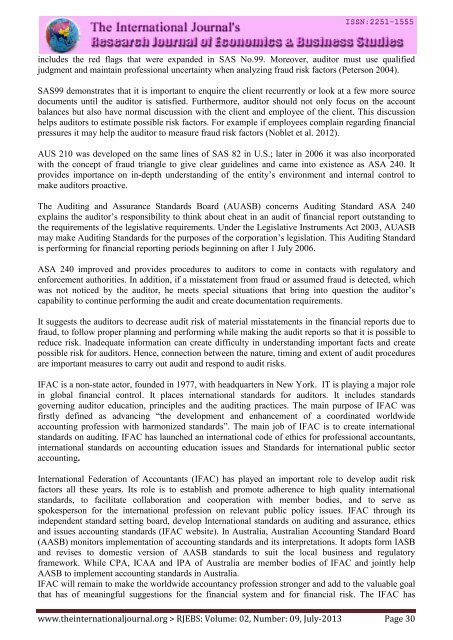Research Journal of Economics & Business Studies - RJEBS - The ...
Research Journal of Economics & Business Studies - RJEBS - The ...
Research Journal of Economics & Business Studies - RJEBS - The ...
Create successful ePaper yourself
Turn your PDF publications into a flip-book with our unique Google optimized e-Paper software.
includes the red flags that were expanded in SAS No.99. Moreover, auditor must use qualified<br />
judgment and maintain pr<strong>of</strong>essional uncertainty when analyzing fraud risk factors (Peterson 2004).<br />
SAS99 demonstrates that it is important to enquire the client recurrently or look at a few more source<br />
documents until the auditor is satisfied. Furthermore, auditor should not only focus on the account<br />
balances but also have normal discussion with the client and employee <strong>of</strong> the client. This discussion<br />
helps auditors to estimate possible risk factors. For example if employees complain regarding financial<br />
pressures it may help the auditor to measure fraud risk factors (Noblet et al. 2012).<br />
AUS 210 was developed on the same lines <strong>of</strong> SAS 82 in U.S.; later in 2006 it was also incorporated<br />
with the concept <strong>of</strong> fraud triangle to give clear guidelines and came into existence as ASA 240. It<br />
provides importance on in-depth understanding <strong>of</strong> the entity’s environment and internal control to<br />
make auditors proactive.<br />
<strong>The</strong> Auditing and Assurance Standards Board (AUASB) concerns Auditing Standard ASA 240<br />
explains the auditor’s responsibility to think about cheat in an audit <strong>of</strong> financial report outstanding to<br />
the requirements <strong>of</strong> the legislative requirements. Under the Legislative Instruments Act 2003, AUASB<br />
may make Auditing Standards for the purposes <strong>of</strong> the corporation’s legislation. This Auditing Standard<br />
is performing for financial reporting periods beginning on after 1 July 2006.<br />
ASA 240 improved and provides procedures to auditors to come in contacts with regulatory and<br />
enforcement authorities. In addition, if a misstatement from fraud or assumed fraud is detected, which<br />
was not noticed by the auditor, he meets special situations that bring into question the auditor’s<br />
capability to continue performing the audit and create documentation requirements.<br />
It suggests the auditors to decrease audit risk <strong>of</strong> material misstatements in the financial reports due to<br />
fraud, to follow proper planning and performing while making the audit reports so that it is possible to<br />
reduce risk. Inadequate information can create difficulty in understanding important facts and create<br />
possible risk for auditors. Hence, connection between the nature, timing and extent <strong>of</strong> audit procedures<br />
are important measures to carry out audit and respond to audit risks.<br />
IFAC is a non-state actor, founded in 1977, with headquarters in New York. IT is playing a major role<br />
in global financial control. It places international standards for auditors. It includes standards<br />
governing auditor education, principles and the auditing practices. <strong>The</strong> main purpose <strong>of</strong> IFAC was<br />
firstly defined as advancing “the development and enhancement <strong>of</strong> a coordinated worldwide<br />
accounting pr<strong>of</strong>ession with harmonized standards”. <strong>The</strong> main job <strong>of</strong> IFAC is to create international<br />
standards on auditing. IFAC has launched an international code <strong>of</strong> ethics for pr<strong>of</strong>essional accountants,<br />
international standards on accounting education issues and Standards for international public sector<br />
accounting.<br />
International Federation <strong>of</strong> Accountants (IFAC) has played an important role to develop audit risk<br />
factors all these years. Its role is to establish and promote adherence to high quality international<br />
standards, to facilitate collaboration and cooperation with member bodies, and to serve as<br />
spokesperson for the international pr<strong>of</strong>ession on relevant public policy issues. IFAC through its<br />
independent standard setting board, develop International standards on auditing and assurance, ethics<br />
and issues accounting standards (IFAC website). In Australia, Australian Accounting Standard Board<br />
(AASB) monitors implementation <strong>of</strong> accounting standards and its interpretations. It adopts form IASB<br />
and revises to domestic version <strong>of</strong> AASB standards to suit the local business and regulatory<br />
framework. While CPA, ICAA and IPA <strong>of</strong> Australia are member bodies <strong>of</strong> IFAC and jointly help<br />
AASB to implement accounting standards in Australia.<br />
IFAC will remain to make the worldwide accountancy pr<strong>of</strong>ession stronger and add to the valuable goal<br />
that has <strong>of</strong> meaningful suggestions for the financial system and for financial risk. <strong>The</strong> IFAC has<br />
www.theinternationaljournal.org > <strong>RJEBS</strong>: Volume: 02, Number: 09, July-2013 Page 30
















